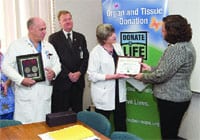Baystate Transplant Services Honored with National Awards
SPRINGFIELD — Baystate Medical Center has been nationally recognized by the U.S. Department of Health and Human Services (HHS) for its success in increasing the number of organs available for transplantation.
Baystate, together with LifeChoice Donor Services, a federally designated organ procurement organization, received the silver Medal of Honor from the Department of Health and Human Services for achieving and sustaining national goals for donation, including a donor conversion rate of 75{06cf2b9696b159f874511d23dbc893eb1ac83014175ed30550cfff22781411e5} or more of eligible donors at Baystate.
“These hospitals have made incredible progress in increasing the number of organs available for transplantation,” said Dr. Mary K. Wakefield, administrator of HHS’ Health Resources and Services Administration, which leads federal efforts to increase organ and tissue donation. “Their efforts reflect the heights Americans can reach when they work together toward a common goal.”
Each of the 428 winning hospitals had eight or more eligible organ donors during the 22-month award period ending in April 2009. The awards were presented to the hospitals based on their performance in meeting or exceeding several goals established by HHS. Baystate Medical Center received the Silver 1 Medal of Honor for achieved Conversion Rate and Donation after Cardiac Death. Hospitals such as Baystate receiving the Medal of Honor achieved a conversion rate of (or exceeding) 75{06cf2b9696b159f874511d23dbc893eb1ac83014175ed30550cfff22781411e5} for a one-year period, and had at least 10{06cf2b9696b159f874511d23dbc893eb1ac83014175ed30550cfff22781411e5} of actual donors that were donors after cardiac death.
“We celebrate Baystate Medical Center and LifeChoice Donor Services collaboration of best practices to integrate organ donation into Baystate’s end-of-life care. The hospital has embraced bereavement care for families experiencing a death, and has seen firsthand donation as an extension of this bereavement care,” said Shelly Fox, hospital development specialist for LifeChoice Donor Services.
Baystate’s Transplant Services program was also honored by HHS with an award representing a 20{06cf2b9696b159f874511d23dbc893eb1ac83014175ed30550cfff22781411e5} or greater increase in the total number of organ transplants performed during the award period.
“This award celebrates the extraordinary contributions of the doctors, nurses, and other staff in Transplant Services at Baystate Medical Center for their collective contributions to saving and improving lives through organ transplantation,” said Deb Savaria, executive director of LifeChoice Donor Services.
Dr. George Lipkowitz, medical director of Transplant Services at Baystate, said the award represents the culmination of a concerted effort to promote organ donation by the hospital and staff in its intensive care units (ICU and PICU), as well as LifeChoice Donor Services.
“Transplant Services is extremely proud and thankful for what has been achieved over the past two years, and we are extremely grateful for these awards and share our success with our patients,” Lipkowitz said.
There are currently more than 140 people on Baystate Medical Center’s transplant list waiting for a life-enhancing new kidney for transplant. And there are well over 1,600 children and adult patients waiting for a kidney from a deceased donor in Massachusetts. Nationally, 79,000 patients are waiting for a kidney transplant, with hundreds more added each month, and some 12 of them die daily while waiting.
Baystate Medical Center offers the only transplant services in Western Mass. for adult and pediatric patients requiring kidney transplants. Transplant surgeons use the latest techniques, including minimally invasive surgery, so that patients experience a faster recovery and spend less time in the hospital. In addition to experienced surgeons, the Baystate Transplant Team includes nephrologists, transplant coordinators, dietitians, pharmacists, and social workers. Living or deceased donor renal transplant is offered as treatment of end-stage renal disease.




Comments are closed.